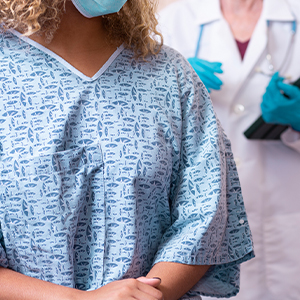Don’t Put Off These Essential Cancer Screenings

Thanks to early detection, more Americans are surviving cancer each year. Here in northern Michigan, Munson Healthcare’s Regional Cancer Network survivor rate is around 80%. One key reason? Early detection.
Finding cancer early—when it’s most treatable—should be a key part of your self-care plan. Common cancer screenings may include a physical examination by a health care provider, an X-ray, or a laboratory test. In many cases, a mix of methods, such as a clinical breast exam, mammography, or even genetic testing, is recommended.
“The COVID-19 pandemic may have caused you to delay or completely avoid cancer screenings to reduce the risk of exposure or infection,” said Zachary Hector-Word, MD, Hematology and Oncology at Munson Healthcare's Cowell Family Cancer Center in Traverse City. "But as we move beyond COVID-19, now's the time to get your screenings back on schedule. Keeping your screenings and checkups on track is the best way to lower the risk of finding cancer at an advanced stage.”
Why Your Care Can’t Wait
According to the American Cancer Society (ACS), regular screenings could save your life. While scheduling a mammogram or colonoscopy may not be top of mind for you right now, screening tests like these can spot cancer before it causes symptoms or spreads to other areas of the body.
Any further delay could also mean a more advanced stage when the disease is eventually diagnosed. Usually, the sooner cancer is found the better the chance it can be treated.
Your provider can tell you which cancer screenings you should have and how often. Your medical history, your family health history, and your other risk factors will all play a role in your screening schedule.
Common Cancer Screenings

The following are general screening recommendations for common cancers. Please note that different organizations may have varying guidelines. If you have an increased risk—due to your family history, for instance—ask your healthcare provider whether you should be screened at an earlier age or more often.
Breast cancer (Women)
The United States Preventative Task Force (USPSTF) recommends women get mammograms every other year starting at age 50. However, the ACS advises yearly mammograms for women ages 45 to 54. Women ages 55 and older can then switch to getting mammograms every other year, or they can choose to continue annual screenings.
Cervical Cancer (Women)
According to the USPSTF, women ages 21 to 29 should get a Pap test once every three years. Women ages 30 to 65 years can choose to have a Pap test every three years, an HPV test once every five years, or a Pap test and an HPV test once every five years. The ACS recommends a different screening schedule, but both organizations note that women older than 65 who have had normal screenings don't need to be screened.
Colorectal Cancer (Both Men and Women)
The ACS recommends starting regular screening at age 45, while the USPSTF advises beginning screening at age 50. Talk with your healthcare provider about the screening schedule and test that works best for you:
- Colonoscopy (most accurate and recommended every 10 years)
- Fecal Immunohistochemistry Test or FIT (every year)
- Flexible Sigmoidoscopy (every five years)
- CT Colonography (every five years)
- Fecal DNA Testing (every three years)
Endometrial Cancer (Women)

It’s important for women to learn about the risks and symptoms of endometrial cancer once they reach menopause. If you experience any unexpected bleeding or spotting, be sure to tell your provider. Depending on your health history, he or she may recommend a yearly endometrial biopsy screening.
Lung Cancer (Men and Women)
The USPSTF recommends a low-dose lung cancer screening for those with a history of heavy smoking, smoke now or have quit within the past 15 years, and are between 50 and 80 years old. It’s recommended to check with your health insurance provider before scheduling with your doctor.
Prostate Cancer (Men)
The USPSTF recommends men ages 55 to 69 talk with their healthcare providers about the pros and cons of PSA screening. For men ages 70 and older, the USPSTF advises against screening. Recommendations from other organizations, including the ACS, differ slightly. However, all organizations agree that men should discuss the potential benefits and risks of prostate cancer screening with their healthcare provider and make informed decisions.
Scheduling Your Screening
Talk with your health care provider to determine the screening schedule and frequency best for you. If your age or family history qualifies you for any essential cancer screening above, please reach out to your primary care provider to schedule your appointment.
If you don’t have a family doctor, use our Find-a-Doctor tool or call our Ask-A-Nurse line at 231-935-0951. Our team will help you find a physician nearby.
If you have immediate questions about your specific symptoms, call Munson Healthcare Ask-a-Nurse at 231-935-0951. Our nurses are answering questions 24 hours a day at no charge to you.